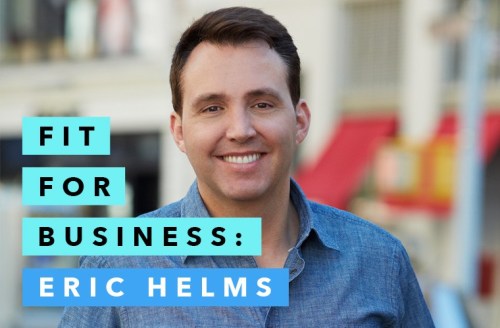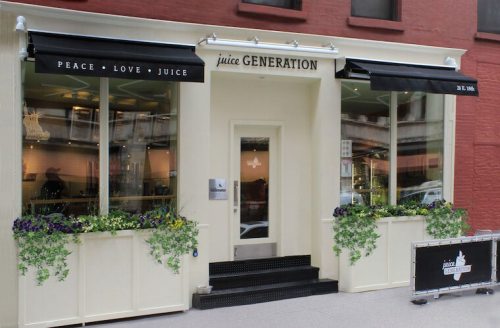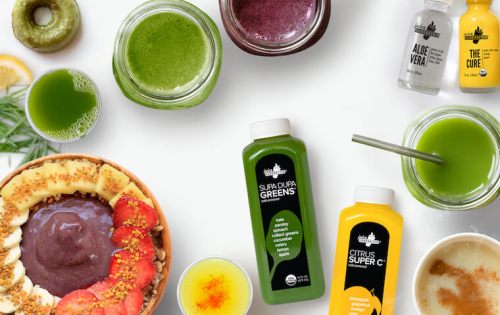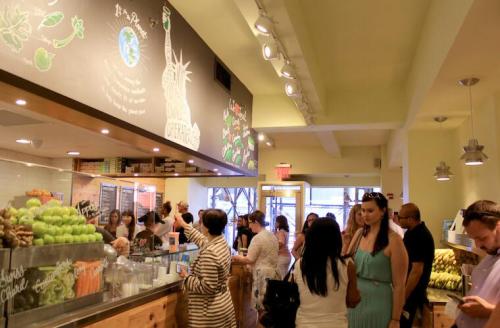Our editors independently select these products. Making a purchase through our links may earn Well+Good a commission
Eric Helms on Juice Generation’s slow and steady path to success
Business advice from Juice Generation's founder, Eric Helms.

Welcome to Fit for Business, a new column from Well+Good’s co-founder and publisher Alexia Brue. Each week, she’ll take you behind-the-scenes with the most successful healthy-living entrepreneurs around the world, so you can learn what inspires them, what challenges them, and what it’s like to work in the (booming) wellness space.
This week she’s sitting down with Eric Helms, founder of the superfood-friendly juice, smoothie, and prepared food spot Juice Generation.
Eric Helms opened the first Juice Generation in 1999, making him a true pioneer in what’s now a crowded and competitive space. The New York City-based juice bar’s slow, steady, bootstrapped success shows you don’t need to raise money to build a thriving business.
Gorgeous produce, lovingly turned into smoothies, juices, and acai bowls right in front of customers has been a winning recipe. Growth will accelerate this September, thanks to a just-inked deal with Simon Property Group. Stay tuned as Juice Generation’s footprint expands from the neighborhoods of New York to high-end malls across the country.
From his decision to self-fund to the inspiration that ’90s supermodels like Christy Turlington had on the business, Helms opens up to Well+Good.

Where did your inspiration to start Juice Generation come from?
There was a tiny juice joint on West Houston Street in the 1990s. It was always packed and you couldn’t go in there without seeing a supermodel like Naomi Campbell or Christy Turlington. It was really down and dirty, and they usually had only one person working there so the line was always very long. I took a friend of mine there one afternoon and when we left he said, “You should open a juice place—you could do it so much better.” Something clicked and that night I couldn’t sleep—I knew I’d found my calling. The next day I decided to quit my job and start Juice Generation. That was 17 years ago.
What differentiates Juice Generation from everything else out there?
We’ve been independently owned and operated since our founding in 1999. There are no outside investors, so we can focus on what’s best for the long-term health of the business. We don’t need to make any compromises to satisfy shareholders in the short-term and can focus solely on what’s right for our brand.
“You couldn’t go in there without seeing a supermodel like Naomi Campbell or Christy Turlington”
On a day-to-day basis, the most obvious difference versus others is that we operate as a restaurant, with the vast majority our products prepared in the store right in front of our customers. Everything is fresh and made-to-order. Customers get to be part of the experience seeing their juice, smoothie, or acai bowl prepared in our open kitchen layout. We give customers a chance to make modifications—requesting a specific plant protein for their smoothie, adding their preferred greens to a juice, or substituting one nut milk for another.
Our bottled juices are cold-pressed daily and never pasteurized. We’ve been focused on local and sustainable before it became a buzzword, and it continues to drive all of our sourcing decisions. We deal directly with local farms and orchards, many of whom have been with us for the past 17 years. I’m proud that I know the purveyors personally.

How did you decide whether to bootstrap the business, seek angel investors, or take VC money?
I took a small loan to open the first store. I worked in the store every day, from opening to close, and loved every minute of it. The profits from the first store were used to open the second store, and profits from the second store helped finance the third store, and so on. The blueprint for self-funding was unintentional, but it worked for us. The environment was much different back then; we were helping to define the category, and there was hardly any venture capital focused on investing in the space. All of that came later. We’ve been able to keep full control of the company, and I never had to put my dream in someone else’s hands.
Can you tell us about a key decision you made that was a turning point for Juice Generation, but frankly could have gone either way?
Since our founding, we had been focused on opening and running neighborhood juice bars. It wasn’t until 2011 that we ventured off that path by opening a location in Columbus Circle. I knew it would be a busy store, but the monthly rent was more than all our other locations combined—it was a real test for the business and it was the most nervous I’d ever been about a new store opening. I’m glad that I took the risk, as the store was successful and changed the model for how we select locations.
“I knew it would be a busy store, but the monthly rent was more than all our other locations combined—it was the most nervous I’d ever been about a new store opening”
Recently we signed a deal with Simon Property Group to bring Juice Generation into high-end shopping malls as Simon redefines the food court experience. It was another big decision for us, but we’re excited to bring Juice Generation to so many new customers across the country.
Attracting talent is always a challenge. How did you convince people to join Juice Generation when you were little more than a dream with a few pieces of equipment?
People are attracted to passion and inherently want to be part of a company that is focused on doing good. Our products are healthy, they taste good, they make people feel better—and all of our ingredients are plant-based. Employees love what our brand stands for and are proud to help make a difference in customers’ lives
We also place great importance on giving back to our community. Right now we’re building an amazing solar-powered greenhouse on West 127th Street that will serve the community with fresh fruit and vegetables at no cost all year-round. The entire project was funded by our customers—we give back 1 percent of every purchase to organizations like Harlem Grown and Catskill Animal Sanctuary.

Can you share a single piece of advice you’d give to another entrepreneur?
Grow or die. A brand must always evolve—especially in the wellness space. I’ve seen many concepts falter because they don’t grow and change with the times.
A business owner’s to-do list is always long. Please share your favorite efficiency hack.
I’m so old school that I start every day with a brand new yellow legal pad. I make my lists in the morning and take notes on it from meetings throughout the day. I’ve tried all sorts of efficiency apps but always come back to the legal pad.
Everyone wants to know: Do you have any open positions?
We are always hiring. It’s part of the “grow or die” philosophy. Finding great people takes work, and we’re constantly looking to add new talent. Passion and dedication are the key characteristics we look for. I’m really proud of the team we’ve been able to build—so many of the people I hired in the early days are still beside me helping to run the business. It’s incredibly gratifying and brings me great happiness.
Sometimes, that “grow or die” philosophy also means getting Gwyneth Paltrow’s approval—here’s how Juice Beauty’s Karen Behnke did it. And if there’s not yet a Juice Generation near you, you can make your own jackfruit tacos using the juice bar’s recipe.
Sign Up for Our Daily Newsletter
Get all the latest in wellness, trends, food, fitness, beauty, and more delivered right to your inbox.
Got it, you've been added to our email list.










